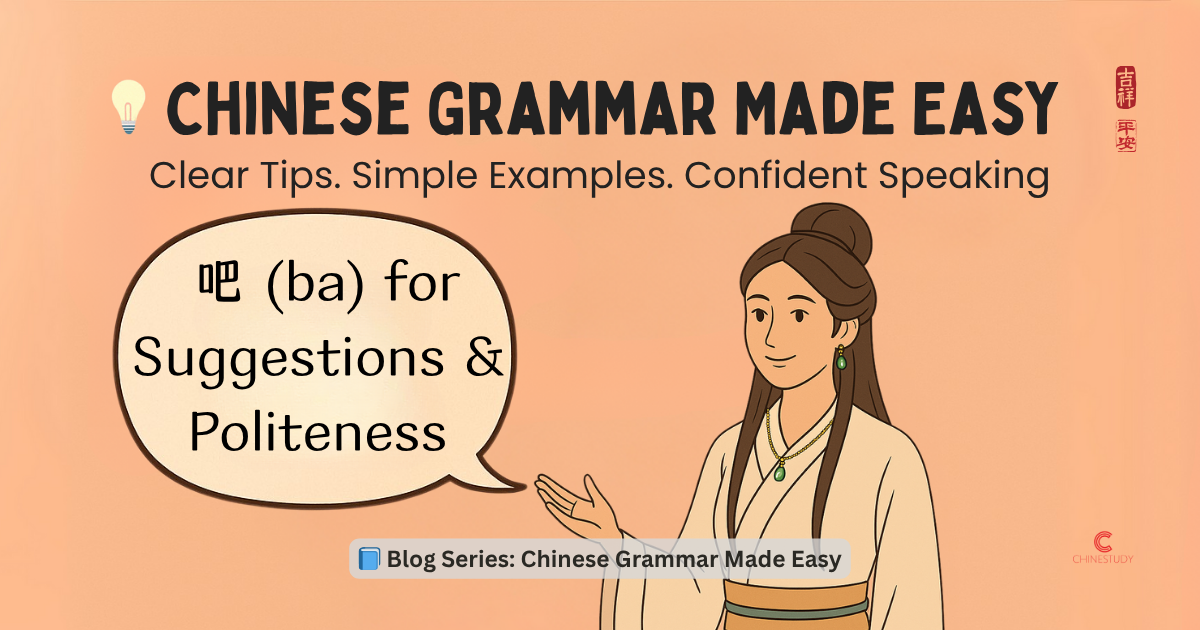📝 How to Use 吧 (ba) in Chinese for Suggestions and Polite Sentences

Have you heard Chinese speakers end sentences with 吧 (ba)?
It’s a small word, but it’s very useful and very common in daily conversation.
Let’s see how 吧 (ba) helps you sound more natural in Chinese!
📚 What Is 吧 (ba)?
吧 (ba) is a sentence-ending particle.
It’s used to make your sentence sound:
- Softer
- More polite
- Less direct
It often shows you are making a suggestion, request, or asking for agreement.
💡 Common Uses of 吧 (ba):
1️⃣ Making a Suggestion
1. 我们走吧。
(Wǒmen zǒu ba.)
→ Let’s go.
2. 早点儿睡吧。
(Zǎodiǎnr shuì ba.)
→ Go to bed early.
2️⃣ Asking for Agreement or Confirmation (Soft Tone)
1. 你也是老师吧?
(Nǐ yě shì lǎoshī ba?)
→ You’re a teacher too, right?
2. 这本书不错吧?
(Zhè běn shū búcuò ba?)
→ This book is good, right?
3️⃣ Making a Request (Polite Tone)
1. 帮我一下吧。
(Bāng wǒ yíxià ba.)
→ Please help me.
2. 等一等吧。
(Děng yì děng ba.)
→ Please wait a moment.
🔔 Notice:
吧 (ba) doesn’t change the meaning of the sentence.
It just makes your sentence sound softer, more friendly, or more polite.
📝 Practice Time!
👉 Rewrite these sentences and add 吧 (ba) to make them sound more polite or natural.
1️⃣ 我们去吃饭。(Wǒmen qù chīfàn.)
2️⃣ 你明天告诉我。(Nǐ míngtiān gàosù wǒ.)
3️⃣ 我们早点儿回家。(Wǒmen zǎodiǎnr huíjiā.)
✅ Answers:
1️⃣ 我们去吃饭吧。
(Wǒmen qù chīfàn ba.)
Let’s go eat.
2️⃣ 你明天告诉我吧。
(Nǐ míngtiān gàosù wǒ ba.)
Tell me tomorrow, okay?
3️⃣ 我们早点儿回家吧。
(Wǒmen zǎodiǎnr huíjiā ba.)
Let’s go home early.
⚠️ Common Mistake
🔸 吧 (ba) is used at the end of the sentence.
Don’t put it in the middle!
✅ Correct: 我们走吧。
❌ Wrong: 我们吧走。
🎯 Quick Tip to Remember
Think of 吧 (ba) as a little “softener.”
It turns a direct statement into something friendlier and more natural.
🚀 Your Turn! Try It in Real Life
Write 3 sentences in Chinese using 吧 (ba).
👉 A suggestion
👉 A soft question
👉 A polite request
Say them aloud or share them with a language partner.
The more you use 吧 (ba), the more natural you’ll sound!
🌟 Want step-by-step guidance?
👉 Check out my course: Mandarin Chinese Grammar Masterclass for Beginners.
👉 Explore the full blog series: Chinese Grammar Made Easy.
Thank you for subscribing!
Have a great day!